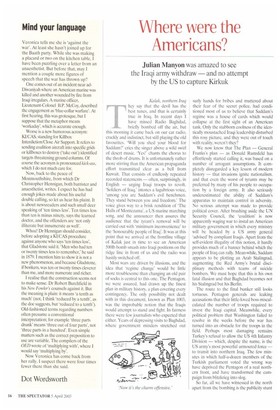Mind your language
Veronica tells me she is 'against the war'. At least she hasn't joined up for the Baath party. While she was making a placard or two on the kitchen table, I have been puzzling over a letter from an anaesthetist. But before that, may I mention a couple more figures of speech that the war has thrown up?
One comes out of an incident near adDiwaniyah where an American marine was killed and another wounded by fire from Iraqi irregulars. A marine officer, Lieutenant-Colonel B.P. McCoy, described the engagement as 'blue-collar warfare'. At first hearing, this was grotesque, but I suppose that the metaphor means 'workaday', which is accurate enough.
Worse is a new humorous acronym: KI/CAS, standing for Killbox Interdiction/Close Air Support. It refers to sending coalition aircraft into specific grids or killboxes to destroy (take out') identified targets threatening ground columns. Of course the acronym is pronounced kick-ass, which I do not much care for.
Now, back to the peace of Monmouthshire, from which Dr Christopher Henn igan, both barrister and anaesthetist, writes. I expect he has had enough jokes made about his useful double calling, so let us hear his plaint. It is about newsreaders and such small deer speaking of 'ten times less'. Ten times less than ten is minus ninety, says the learned doctor, and the offenders are 'not only illiterate but innumerate as well'.
Whoa! Dr Hennigan should consider, before adopting a KI/CAS procedure against anyone who says 'ten times less', that Gladstone said it. 'Men who had ten or twenty times less to remember,' he said in 1879.1 mention him to show it is not a new phenomenon, and because Gladstone, if honkers, was ten or twenty times cleverer than me, and more numerate and richer.
I realise that the construction seems not to make sense. Dr Robert Burchfield in his New Fowler's counsels against it. But the meaning is plain: it means 'a tenth as much' (not, I think 'reduced by a tenth'. as the doe suggests, but 'reduced to a tenth'). Old-fashioned terms regarding numbers often presume a conventional interpretation; for example 'three parts drunk' means 'three out of four parts', not 'three parts in a hundred'. Even simple matters such as the correct preposition to use are variable. The compilers of the OED wrote of 'multiplying with', where I would say 'multiplying by'.
Now Veronica has come back from her rally. I suspect there were four times fewer there than she said.
Dot Wordsworth


































































 Previous page
Previous page